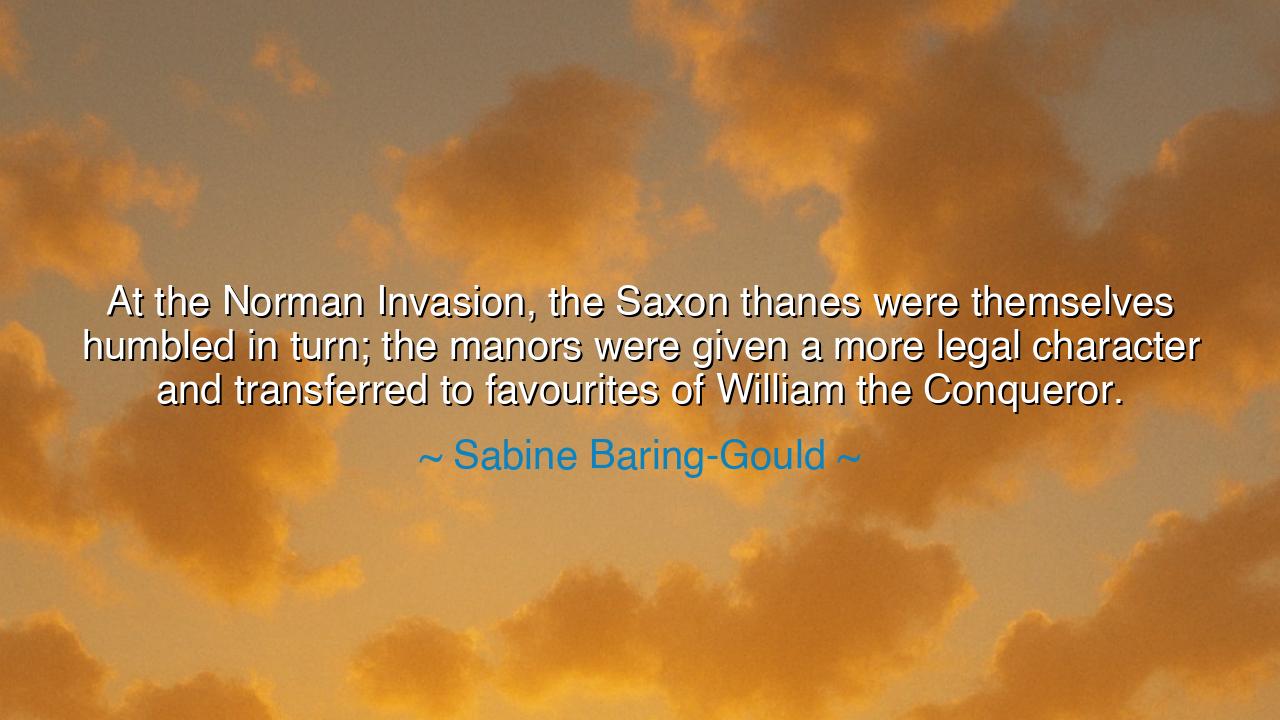
At the Norman Invasion, the Saxon thanes were themselves humbled
At the Norman Invasion, the Saxon thanes were themselves humbled in turn; the manors were given a more legal character and transferred to favourites of William the Conqueror.






In the chronicles of human conquest and governance, there are moments when the tides of history wash over the proud and reshape the order of society. Sabine Baring-Gould’s words, “At the Norman Invasion, the Saxon thanes were themselves humbled in turn; the manors were given a more legal character and transferred to favourites of William the Conqueror,” speak to the profound transformation wrought by conquest, law, and power. Here lies a meditation on the fragility of status, the inevitability of change, and the enduring role of legal structures in legitimizing authority and wealth. The Saxon lords, who once commanded local dominion, were humbled not merely by force but by the orderly application of law and the strategic redistribution of land.
From the walled cities of antiquity to the courts of medieval Europe, rulers have recognized that true dominion is established not solely through strength of arms but through codification and the sanction of law. In this context, Baring-Gould’s reflection highlights the wisdom of William the Conqueror: the transfer of manors and their formal legal characterization transformed conquest into governance. By granting lands to his loyal followers, William ensured that power was anchored in recognized law, not merely in fleeting martial success. This intertwining of conquest and legal authority has echoed across centuries, illustrating that stability depends on legitimacy as much as on strength.
The historical origins of this transformation lie in the Norman Invasion of 1066, when William of Normandy crossed the English Channel and defeated King Harold at the Battle of Hastings. In the aftermath, the Saxon thanes, who had wielded power for generations, were dispossessed. Their manors, once governed by custom and local influence, were reconstituted with a more legal character, formally recorded and redistributed to Norman nobles. This act was both practical and symbolic: it cemented William’s control and demonstrated the supremacy of law-backed authority over inherited tradition or mere force.
Consider a vivid example in the case of the manor of Wallingford. Before the conquest, it had been held by Saxon thanes with broad customary rights. After the Norman takeover, it was granted to a Norman knight, its boundaries and obligations formally documented in the Domesday Book. The Saxon lords were humbled, yet a new order emerged, one in which law and formal record-keeping legitimized landholding and structured societal hierarchy. Through this, the Norman rulers established a durable system of governance, one that would influence English law for centuries.
Baring-Gould’s reflection carries a broader philosophical lesson. Change, even when abrupt or imposed, can be made enduring and just through the formalization of law. The humbling of the Saxon thanes was not merely a tale of defeat but a transformation of society toward order, accountability, and codified rights. It teaches that power without law is fleeting, and that the security of institutions and property arises from the careful application of rules and recognition of authority.
For contemporary readers, this history resonates beyond feudal England. Whether in business, government, or personal affairs, those who rely solely on custom, tradition, or brute strength may find themselves displaced unless their actions are anchored in recognized structures. Codify agreements, honor formal processes, and ensure that authority and obligations are clearly defined, for only then can stability endure amid the vicissitudes of fortune and circumstance.
Practically, the lesson extends to the cultivation of resilience and adaptability. Recognize that external change is inevitable, and prepare by grounding your actions in systems that outlast immediate circumstances. The Saxon thanes were humbled because they had relied on inherited privilege rather than formalized authority. Modern leaders, entrepreneurs, and citizens can learn from this: preparation, documentation, and adherence to recognized frameworks safeguard influence and legacy.
Thus, Sabine Baring-Gould’s words resound as a timeless teaching: conquest and change are inevitable, but law and formal recognition transform upheaval into enduring order. Let all who hear this lesson remember that strength may win battles, but legitimacy and codified authority secure kingdoms. In this fusion of power and law lies the wisdom of the ancients, guiding societies and individuals alike toward stability, justice, and enduring influence.






AAdministratorAdministrator
Welcome, honored guests. Please leave a comment, we will respond soon